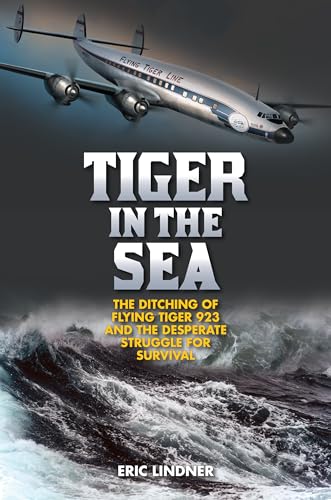As a professional researcher, I love a well-researched book. That's why I respect author Eric Linder's work on "Tiger in the Sea," a deeply documented book about a U.S. military plane that went down in the Atlantic Ocean in 1962.
Linder says he did 1,700 interviews for the book, 94 of them in-person. He also dug through government documents, news articles and the personal memoirs of survivors. Though there were setbacks — in one chapter, he recalls his stunning discovery that records of the crash were missing from the National Archives — his persistence helped him assemble this detailed 2021 book.
Still, it take more than research to make a good book. You also need smart storytelling, thoughtful organization and the restraint to avoid cluttering the book with excessive detail. Unfortunately, "Tiger in the Sea" falls short on all those measures.
To be sure, the tale of Flying Tiger Flight 923 is a gripping story. The plane lost three of its four engines while flying over the Atlantic, forcing the pilot to land in the frigid ocean in the dark of night. All 76 aboard survived the ditching, but in the chaotic evacuation from the plane, lifeboats were lost, and many passengers ended up in the sea.
After a harrowing eight hours, and an intense rescue effort by several nations, survivors were brought aboard a Swiss merchant ship. A total of 48 people survived, 28 died.
The best part of the book is Linder's account of the passengers' frantic survival efforts in the wake of the ditching. If you've ever wondered what it would be like to be caught in such a situation, Linder puts you there.
He captures the terror and confusion, from multiple perspectives, of people struggling to put on life vests, swim through gasoline-choked waves, and find a lifeboat amid the inky blackness of the night. The lifeboat brought little solace: 51 soaked people end up crowded onto an upside-down inflatable that was only built for half that many.
But aside from that dramatic section, much of the book is bloated and overstuffed with information. At the onset of the book Linder, like too many authors, makes the mistake of dumping a crate of character background on the reader all at one. The problem with this approach is that early in the book readers lack the context to understand why each person is important to the story.
The next section describes the plane's engine troubles and gradual descent into the sea. This should be a tense and suspenseful read, but Linder describes every instant from multiple perspectives, drawing out the scene into the most slow-motion crash ever.
The post-crash portions are similarly bloated. Rather than trying to make a readable story, Linder seems to be attempting to create a Flight 923 reference book by pulling every detail from his notebooks, citing every wrinkle in the government crash investigations, and going into far too much detail on the survivors' post-crash lives.
Linder also fails on a basic issue of transparency.
The central character in the book is pilot John Murray. Linder portray Murrays as keeping a cool head in the cockpit as the plane was plummeting toward the sea, and skillfully putting the plane down in a manner that kept it from breaking up upon impact. He also notes that Murray's last-minute decision to retrieve a flashlight from the cockpit before evacuating was crucial to the eventual rescue.
In the post-crash investigation some questioned Murray's actions, but Linder is quick to shut those doubts down, quoting survivors and experts praising Murray. In short, Linder portrays Murray as a hero.
It's not until near the end of the book that Linder reveals an important fact: Murray is his father-in-law. I'm not here to question whether Murray was indeed a hero, but this revelation makes me wonder how unbiased Linder's account is. The author should have revealed the familial connection earlier in the book.
Finally, for all of Linder's deep research, the book largely ignores one important group in the story: The dead. The author has talked extensively to survivors and their families, but he only barely mentions a handful of people who ended up dead. Given the many interviews Linder did, why weren't more of them with the families of those who died? Might some of them question whether Murray was a hero?
"Tiger in the Sea" isn't a bad book; I just wish it were better. Those with a deep interest in Flight 923 may get a lot out of it. More casual readers should focus mostly on the ditching and rescue, while skimming the rest.
